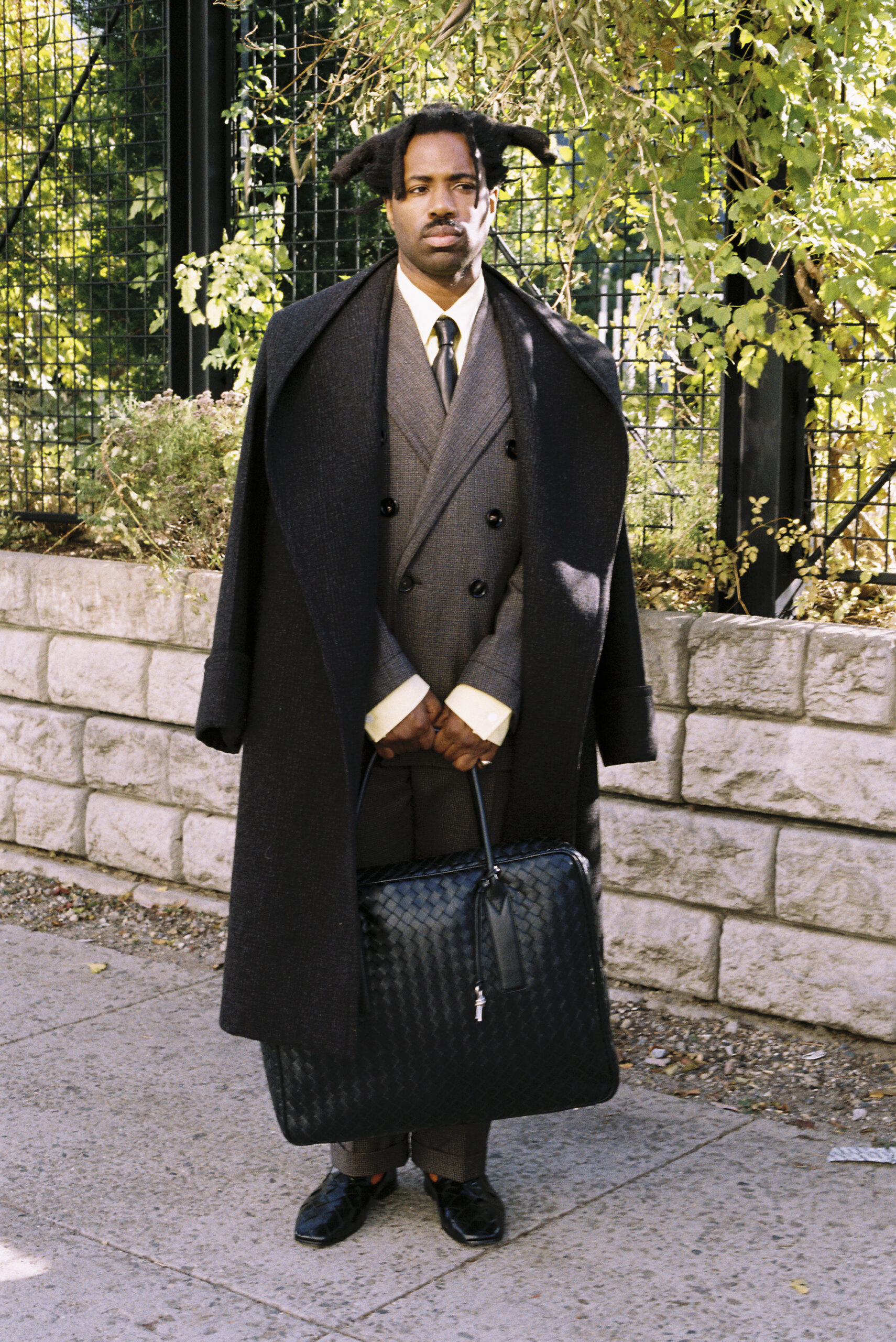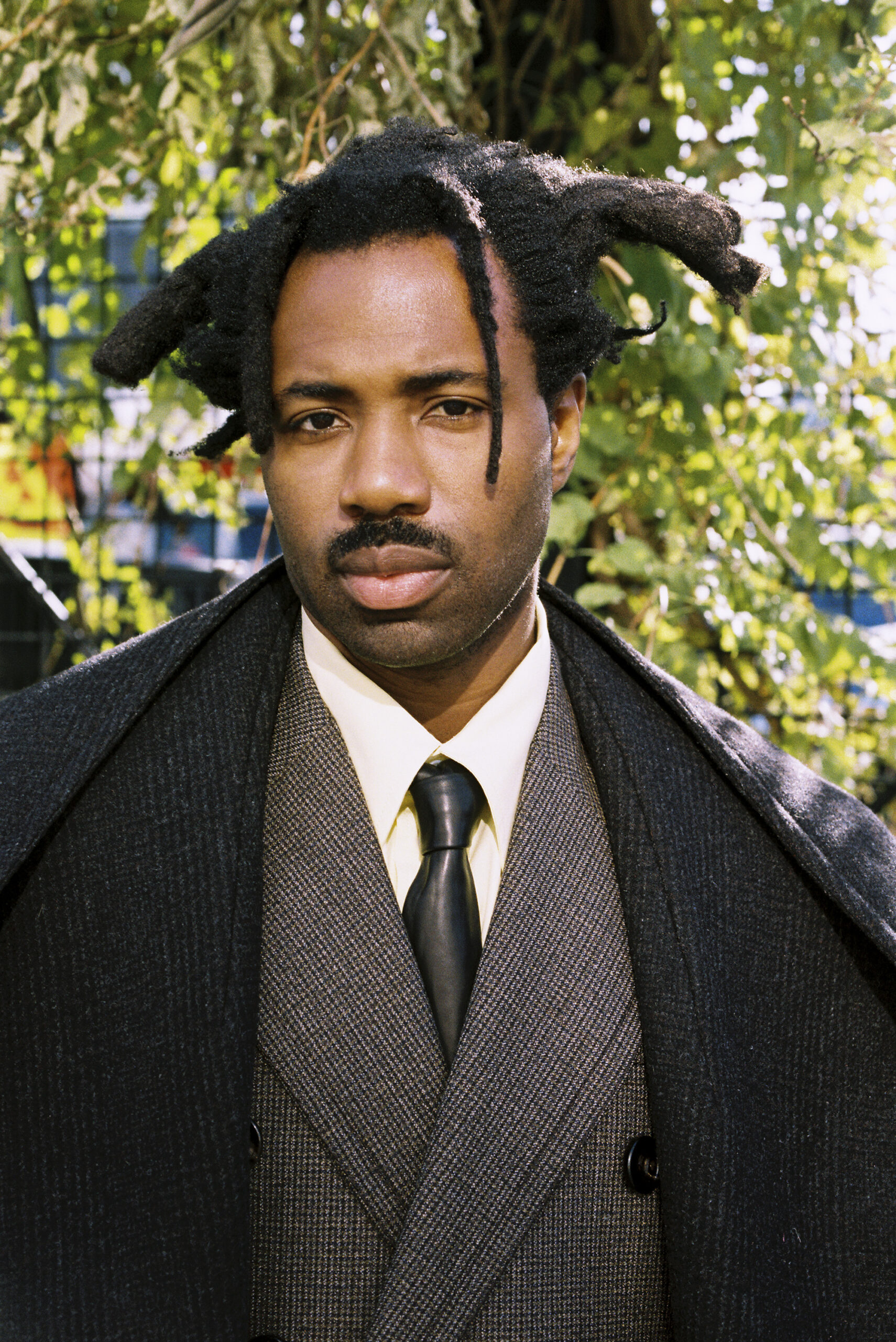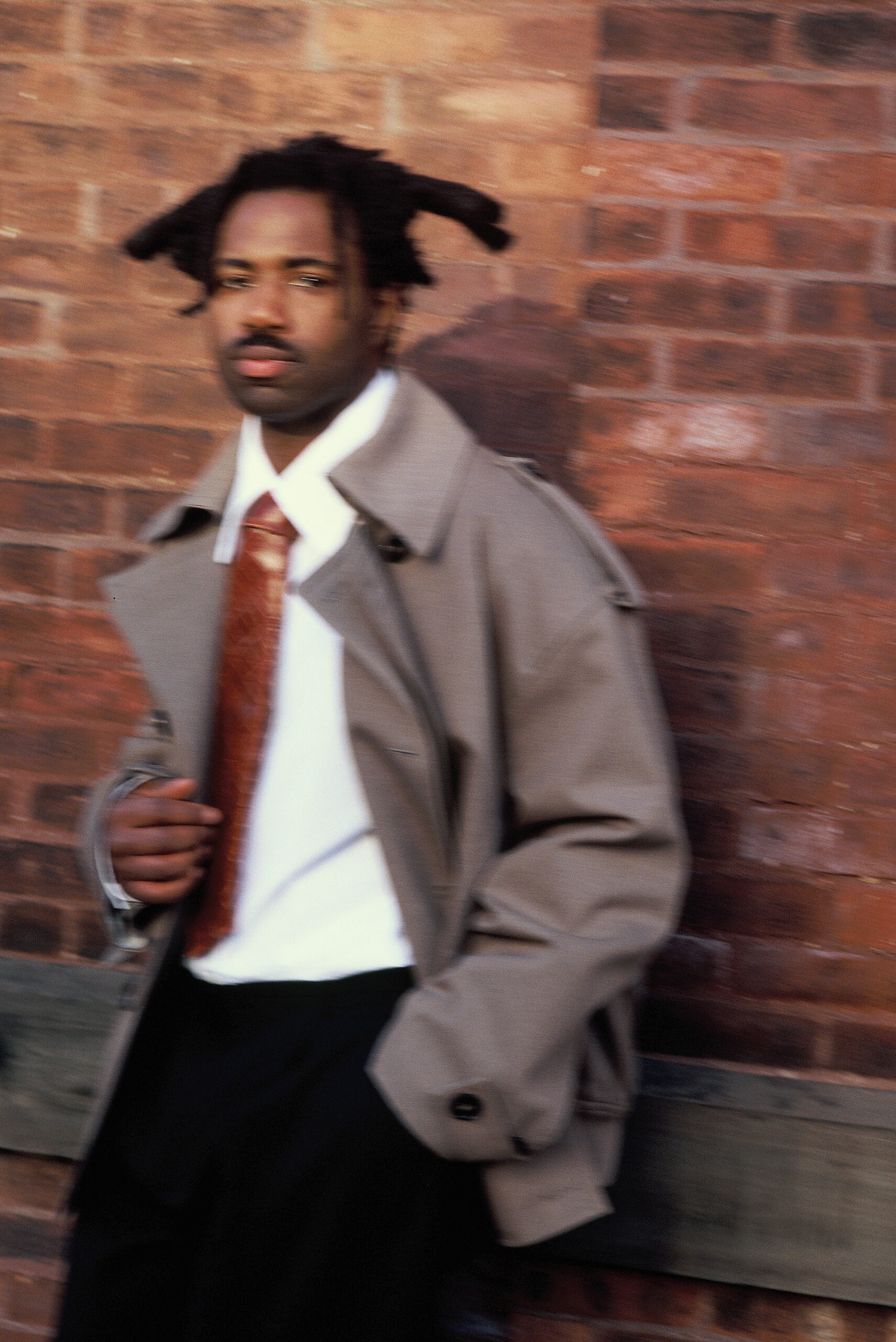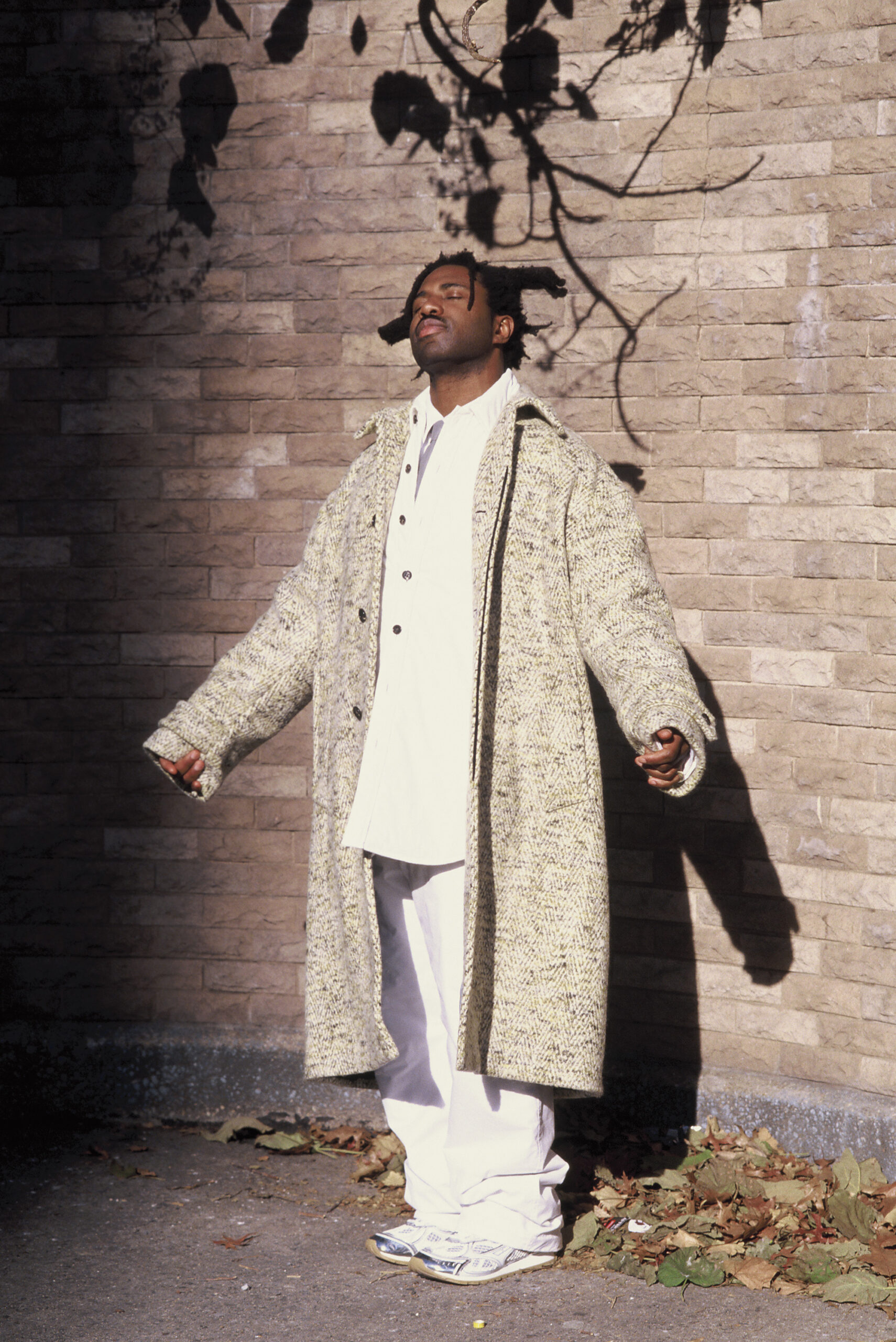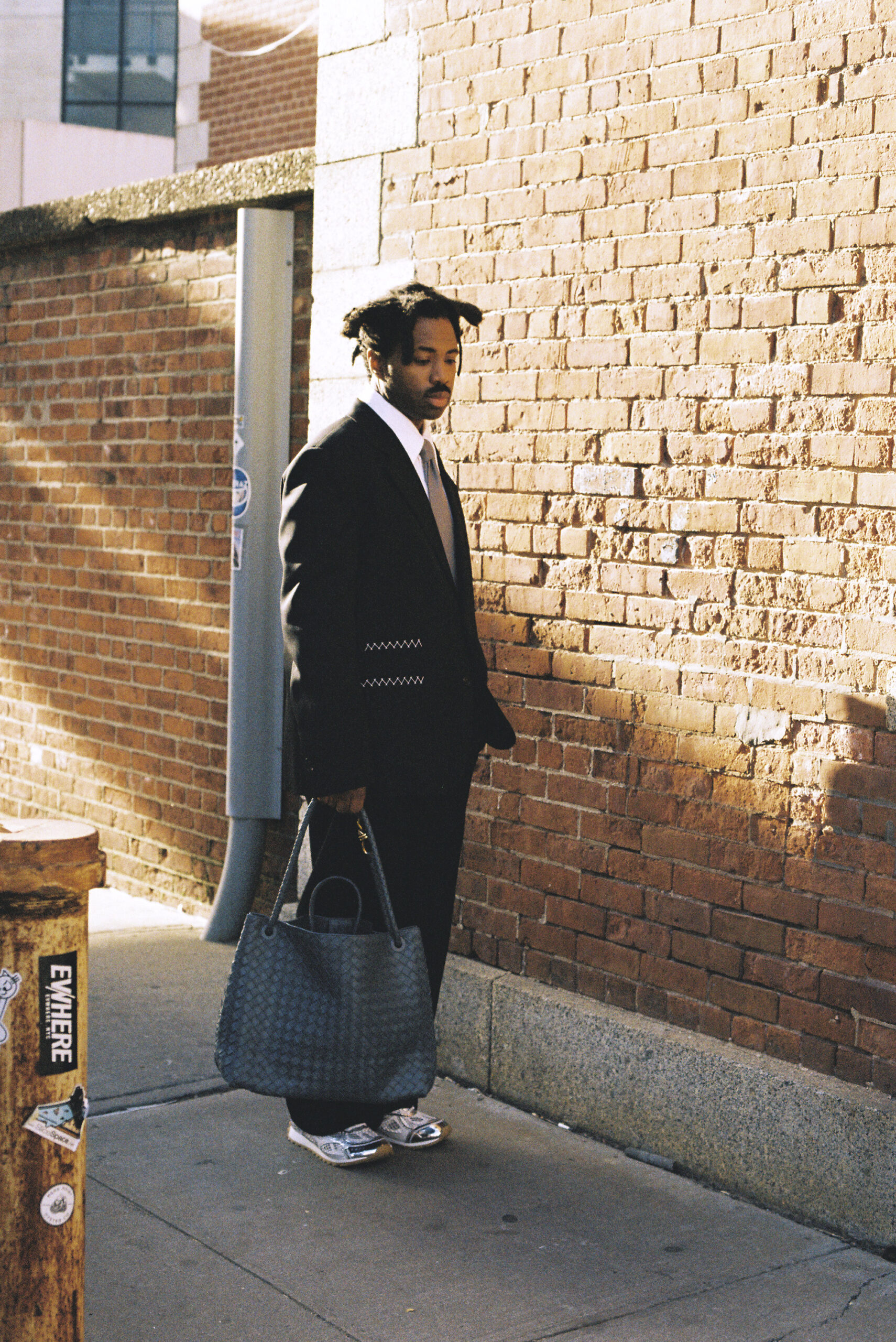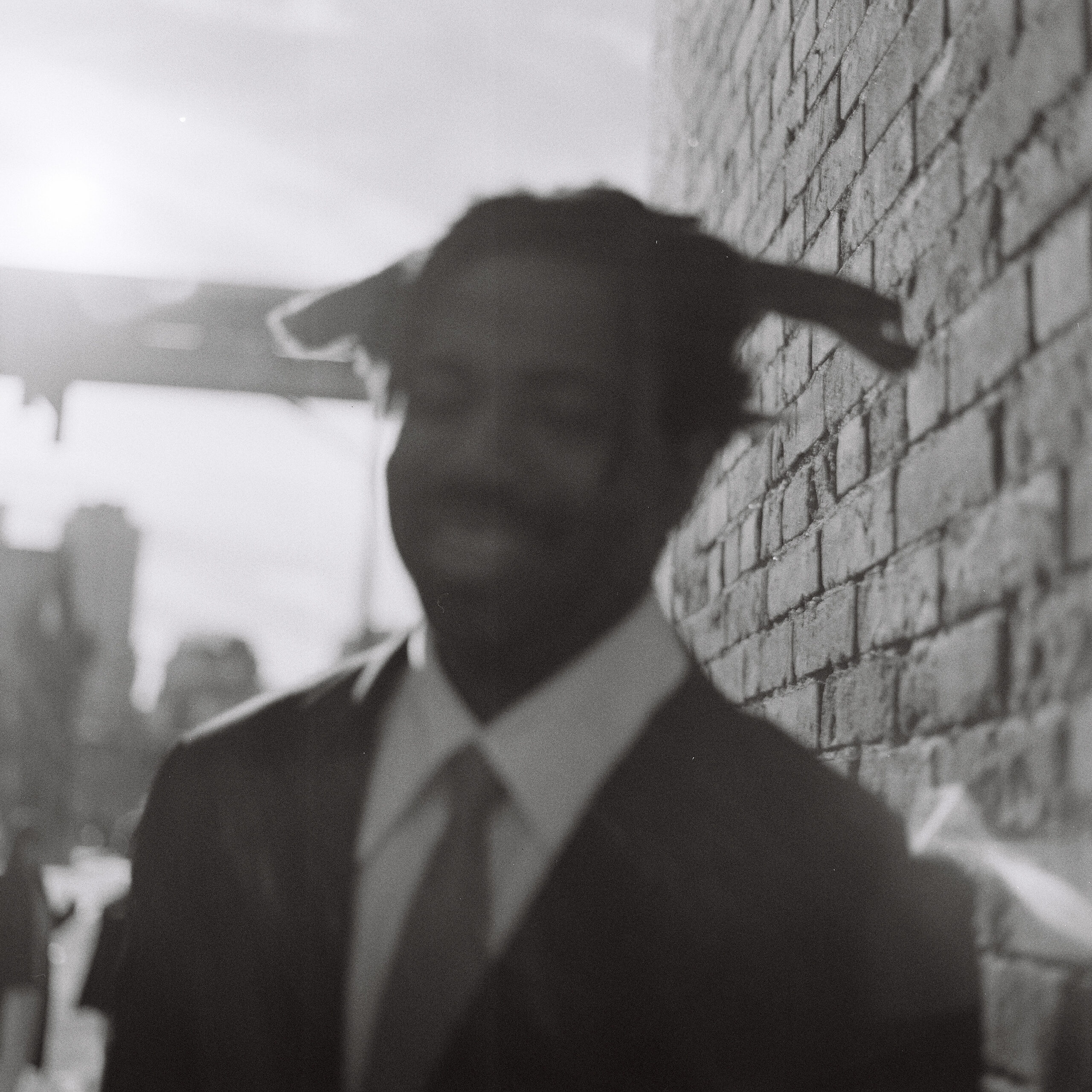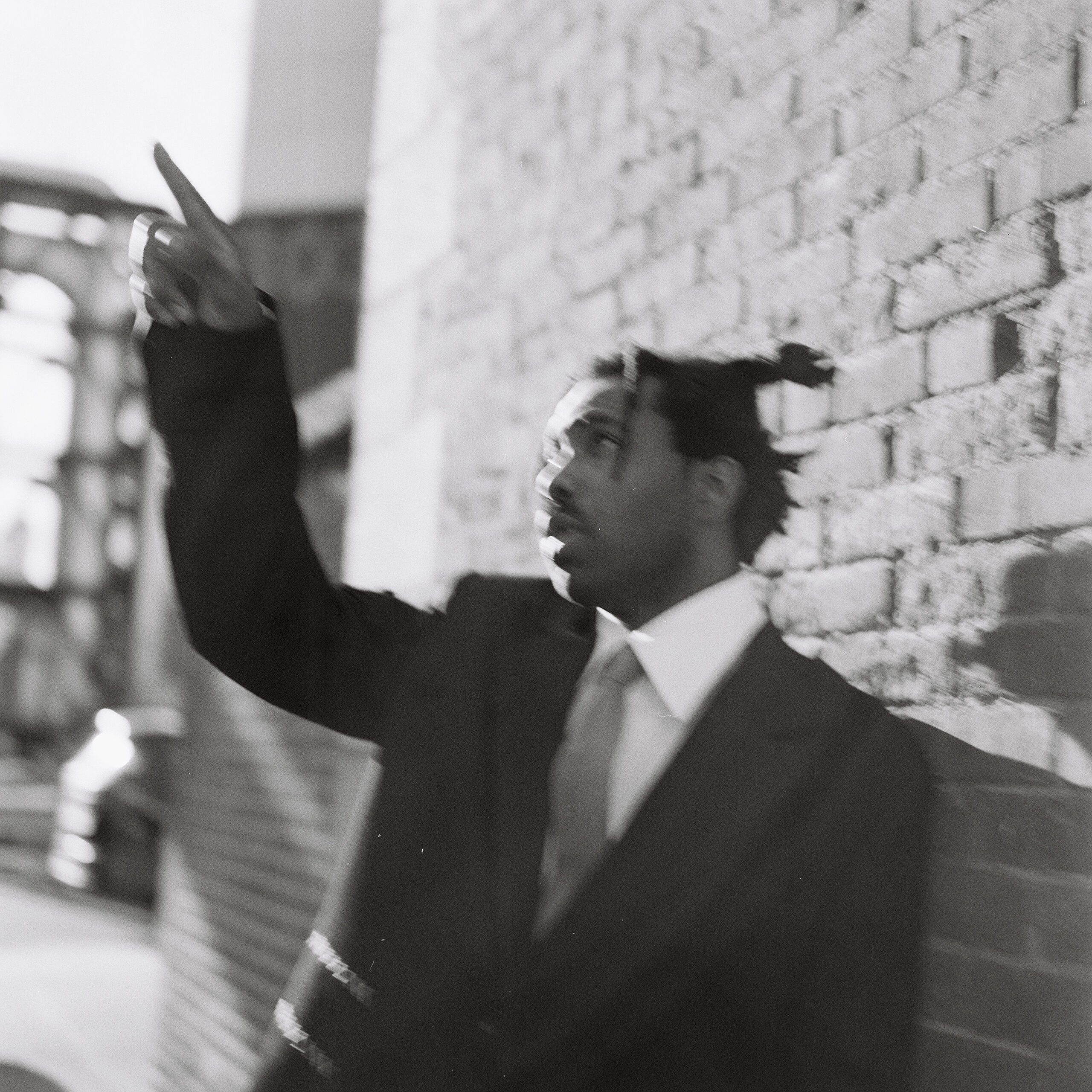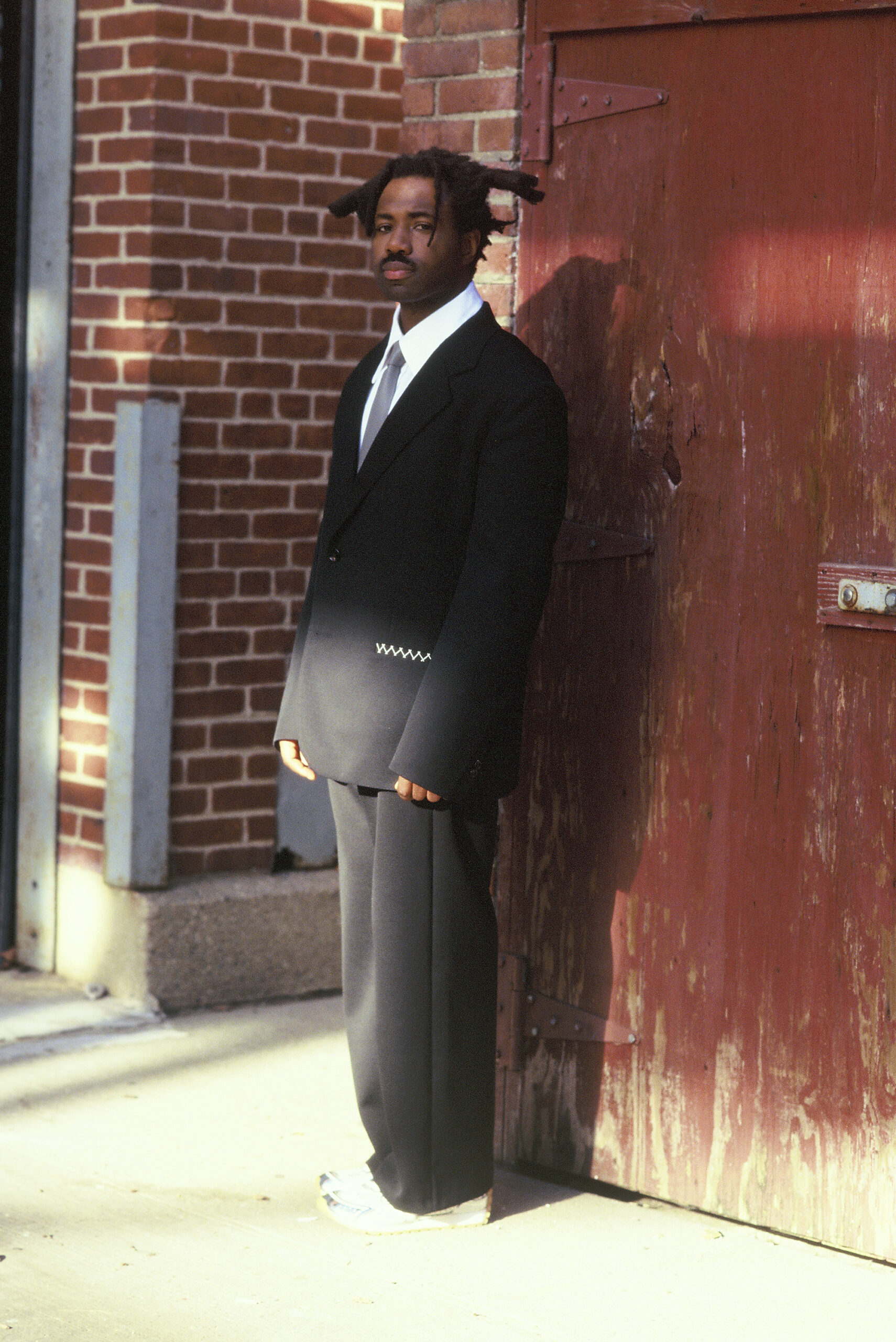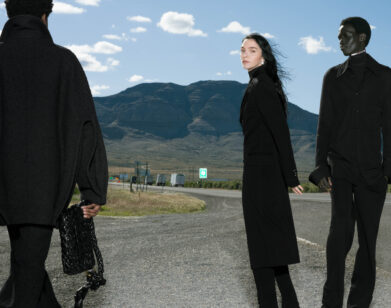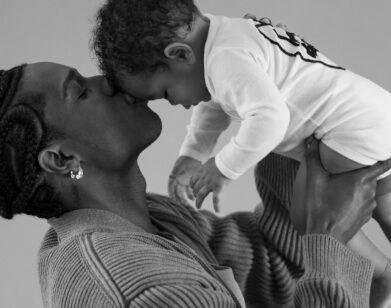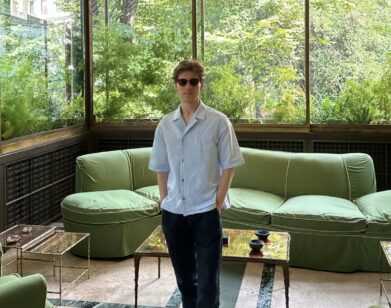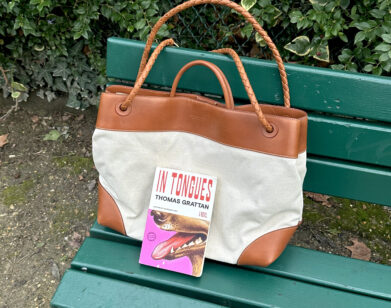RECORD
Sampha on Headstands, Homesickness, and Spiritual Intervention
To Sampha, there’s a lot in a name. Lahai was his grandfather’s name—his namesake—and it’s the title of his transcendent sophomore album. Since Process, his debut, the British musician’s life has changed in a few ways, most recently via fatherhood, which has made his typically wistful lyricism a little more upbeat. But he has the same natural musical instincts he did as a kid, when he first fell in love with playing the piano. “I liked to dance when I was younger, I had a bit of rhythm,” he told us a few weeks after Lahai‘s release. “But it was only in my teens when I really started to recognize that this is something I’m really in love with.” When Sampha called us up from Paris during his press tour to talk party tricks, psychedelic cartoons, and existential crises, he was just as pensive as you’d expect.
———
MEKALA RAJAGOPAL: Thank you for joining today, I know you’re on tour in Europe.
SAMPHA: Yeah, I’m in Paris at the moment. I’m just doing a few European dates, but I was in the US for quite a while and it’s been really good.
RAJAGOPAL: It’s been a couple months since the album dropped, but congratulations. How long was it in the making? It’s been such a while since your first album.
SAMPHA: All in all, it took about two and a half years, although sometimes it’s difficult to locate the genesis of when I started it.
RAJAGOPAL: In a way it’s good that we’re speaking after the release because literally everyone I know is in love with this album. How do you feel about the reception?
SAMPHA: Wow. I mean, I try to take it in positively and not play it too cool, because I tend to do that, but I also take it with a pinch of salt. It’s been lovely connecting with people, especially playing live and seeing how people react to songs and how the music has affected them. It’s been a positive output from my side into the world, and it feels complete, so I’m pleased that people seem to be connecting to it.
RAJAGOPAL: Now that you’re on tour, do you feel like your favorite songs are the crowd’s favorite songs?
SAMPHA: No. It is one of those things I couldn’t really predict. I didn’t really know what people would connect to. You never know what the collective consciousness is going to be. Some people do. Some people are talented at that, and I’m not. [Laughs] There’s certain tracks that I didn’t think would be so popular in the context of my music, but the crowds have been connecting to, especially in dancing circles and stuff like that.
RAJAGOPAL: I love that, it’s a little unexpected for your music. And in the past, your collabs were how a lot of people were introduced to you, but you don’t have many features on this album. Do you feel like you’re trying to break away from that at all?
SAMPHA: No, it’s organic. A lot of the people who I worked with on the record are London-based. I made most of this album in London, and most of them are people I know already from watching or being part of live shows. Like Lea Sen, we both were playing with this other band called Speakers Corner Quartet, and that was the first time I heard her. She opened up the show and it was incredible. So when I made the song, her voice came to mind. I had a lot of jam sessions in London. A lot of the musicians that I work with like to make things from scratch. COVID and having a child meant I didn’t really travel as much as I wanted to, so it just naturally ended up like this. This record is quite family focused.
RAJAGOPAL: How much of your process is improvised, would you say?
SAMPHA: I’ll take in information and I’ll incubate things. I don’t really plan. The most planning of sessions I’ll do is who’s going to come, the equipment, and what kind of production style I’ll go for, and then I’ll just go with the flow. It’s a lot of improvisation.
RAJAGOPAL: Do you have a dream collaborator, dead or alive?
SAMPHA: Dead or alive? Sometimes I would like to meet certain artists at a particular time in their life as opposed to just getting in a room with them right now. I guess there’s the obvious ones. I would have loved to be around Stevie Wonder or Steve Reich when he was making particular songs. Then there’s musicians of now who I really admire, like Nala Sinephro and Jason Moran, who are both jazz musicians, and Noname. But there’s lots of people I’d love to talk to. I would love to talk to Sun Ra.
RAJAGOPAL: Just for a chat.
SAMPHA: Definitely.
RAJAGOPAL: I always like to know what people were like as a kid. Were you that kid who was always singing?
SAMPHA: I was definitely musically inclined. I liked to dance when I was younger, I had a bit of rhythm. But it was only in my teens when I really started to recognize that this is something I’m really in love with.
RAJAGOPAL: Do you have any core musical memories?
SAMPHA: There was this British band called Zero 7, and I remember they had this album called Simple Things. There was a song off the album that played on Magic FM, and I was like, “What is this?” The first time I listened to Songs in the Key of Life was an incredible moment, and to Minnie Riperton. My brother bought this Minnie Riperton anthology and on it was a Rotary Connection song called “I’m the Black Gold of the Sun.” I remember listening to that and my mind was just blown. There’s loads of moments I had growing up. There were old cartoons that had psychedelic rock, too. When I listened to them when I got older, I was like, “This was really trippy,” and I was obsessed with this when I was five years old. I recognized that I had had ears for sonics from an early age.
RAJAGOPAL: What was the cartoon?
SAMPHA: It was a Jack and the Beanstalk video. [Laughs] There’s so many. But there was this particular one. I need to find it, I had it on VHS.
RAJAGOPAL: I used to be obsessed with Jack and the Beanstalk, the storybook version, though.
SAMPHA: Yeah, the drawing was cool of the giant and the princess in the clouds.
RAJAGOPAL: It’s the idea of climbing all the way into the heavens.
SAMPHA: Yeah, it’s pretty out there. And that music definitely emphasized the story in a psychedelic way. It’s an old video. I feel like it was made in the ‘80s.
RAJAGOPAL: Speaking of childhood, I was first introduced to you from your initial Tiny Desk, where you were playing the piano so beautifully and you had one song called “(No One Knows Me) Like the Piano.”
SAMPHA: That song was a note to my piano, and to my parents and my upbringing as well. They’re some of the things you take for granted. Everyone gets old and starts to recognize, “My parents were just like me. They weren’t born parents. They had to struggle.” But the piano was also an instrument for me to express myself emotionally. I feel like it’s so important for people to have instruments around them to access parts of themselves that wouldn’t have been possible without that bridge.
RAJAGOPAL: It’s like learning a language. I feel like every kid should learn a second language and learn an instrument.
SAMPHA: 100 percent. It opens you up to different ways of thinking.
RAJAGOPAL: Tell me about your new band.
SAMPHA: I had another band who I was touring with on my first record, Process, but I had to find new musicians to play with. It was quite a tall order, but I found a really great five-piece of musicians. We really created a strong bond and they embody the music beautifully. We’ve been playing since June and I’ve had a lot of fun with them. Luckily they’re quite serious in comparison to me, so they keep me on the straightened arrow. It’s been good to have that type of people around.
RAJAGOPAL: Do you think you’re not serious?
SAMPHA: It’s not that I’m not serious, but I like to go into trains of thought, or I might get too caught up in something and people are like, “Yo, what are we doing next?” I can be a ponderer and it’s nice to have people who can just bring you back down to earth.
RAJAGOPAL: I’m thinking of what you said about the moment where everything about your family clicks when you’re an adult, and there are a lot of family themes in your work and your life right now.
SAMPHA: Yeah. I was battling a lot of things existentially in terms of feeling like an individual and feeling alone or wondering what happens after you pass away. Being scared of death can paralyze you in your life. Having lost people, I’m wondering what spirit is and where they are, and thinking about what’s beyond. And I’m feeling a strong sense of people that I’ve lost through my child because of our bloodline connection. I can see my mother in my daughter and having lost her, it’s a feeling I haven’t had for a while. I’m just recognizing my part in this relay of life, which I’m not sure why I’m on. It’s quite a bomb recognizing that there’s more to you than just you. Having a child is quite humbling in that way. Sometimes in life you need to have a bird’s eye view to recognize what’s around you and feel centered. I can keep going on and on, but I haven’t really figured it out. There are lots of trains of thoughts I was having at the time and they kind of crystallized in the music.
RAJAGOPAL: Do you consider yourself a spiritual person?
SAMPHA: That’s the thing. I think I was contemplating what that meant, and there’s times in life where everyone needs perspective. There’s times where I just needed to feel something. Sometimes you might come across someone who can articulate exactly what’s going on for you, but you don’t really give it enough gravitas because you can’t articulate it, just like a great song. I feel like great orators might be spiritual. Who knows? Life is just one big spirit thing, whatever that is. There are times when I need to disassociate myself, and I feel like spirituality is just one method that I’m attracted to. I think we’re all spiritual, if you know what I mean, but I still need to figure out what that means to me.
RAJAGOPAL: There’s something cool about perpetually figuring that out and not being firm in any belief. I think that’s more interesting.
SAMPHA: Yeah, definitely. I mean, discipline is definitely a virtue, and there’s times where it feels like I need to actually find a practice or really investigate what these people have been saying for thousands of years. I’m on a journey.
RAJAGOPAL: What gets you in the mood to write?
SAMPHA: Instruments, generally speaking. I know it sounds weird, but I find them magical things sometimes. It’s always incredible the things you could do with it. And there’s pianos in so many people’s front living rooms that probably never get played.
RAJAGOPAL: [Laughs]
SAMPHA: There’s so many times I’ve just had a 20-minute break to play the piano and now I just wrote a song that’s on my album and I’m playing it everywhere. Learning something new inspires me too. Trial and error.
RAJAGOPAL: What’s your ideal studio environment like?
SAMPHA: Sometimes it’s like what’s going on inside of you that’s more important than the external. Other times, open studios and being surrounded by nature and having a lovely view while you’re making music is definitely a luxury, I must say. Sometimes it’s lots of equipment, lots of toys, and sometimes it’s a minimal thing, being surrounded by plants. But ideally, I like to get away. I like places that are remote.
RAJAGOPAL: Do you get homesick when you’re away or on the road?
SAMPHA: Yeah. I like being grounded. Sometimes home can just mean feeling settled in an energy that feels secure, wherever that is. There’s times where the home feels like that, and there’s times where the home feels like not that, but home is the feeling.
RAJAGOPAL: For sure. If we were to take it literally, what’s your dream home look like?
SAMPHA: That’s a good one. Sometimes you wonder, do you want a home to express yourself or do you want a home to edit how you feel? You know what I mean? I think it’d be relatively minimal, but with some strong pieces. I would like a home that’s not too cluttered, because you can have a great home, but then you just fill it up with loads of shit. [Laughs] Being surrounded by nature is a beautiful thing. Somewhere by the sea, where I could make music and create, but also chill and be social. Have lovely sofas and everything—
RAJAGOPAL: A conversation pit. [Laughs]
SAMPHA: Yeah, one of those. My dream would be somewhere in West Africa by the sea.
RAJAGOPAL: I think we all dream of taking it back to our home country. Retirement vibes.
SAMPHA: Yeah, taking it back, ideally for early retirement.
RAJAGOPAL: Do you have any hidden talents?
SAMPHA: I can do a headstand.
RAJAGOPAL: Can you really?
SAMPHA: Yeah, I can headstand for quite a while.
RAJAGOPAL: Do you practice yoga?
SAMPHA: Not really.
RAJAGOPAL: How did you end up—
SAMPHA: From a young age, I just had a strong neck.
RAJAGOPAL: So only on your head, or with the support of your—
SAMPHA: Oh, just on my head. One of my party tricks. Most of my talents are out there.
RAJAGOPAL: No, that’s a good one. Can you also carry things on your head? I always wished I could do that.
SAMPHA: No, I can’t, but my daughter can somehow.
RAJAGOPAL: I think you need to have a flat enough head.
SAMPHA: Yeah. Or extreme balance and skill.
RAJAGOPAL: Totally. Thank you so much. It was great talking to you.
SAMPHA: Likewise. Take care.
RAJAGOPAL: Good luck on your tour.
SAMPHA: Thank you. Bye.
———
Grooming: Ayaka Nihei using MAC Cosmetics at Walter Schupfer Management.
Tailor: Sam Walls.
Photo Assistant: Marley Stewart.
Styling Assistant: Veskananda Naratama.
Location: Chalet Studios.

